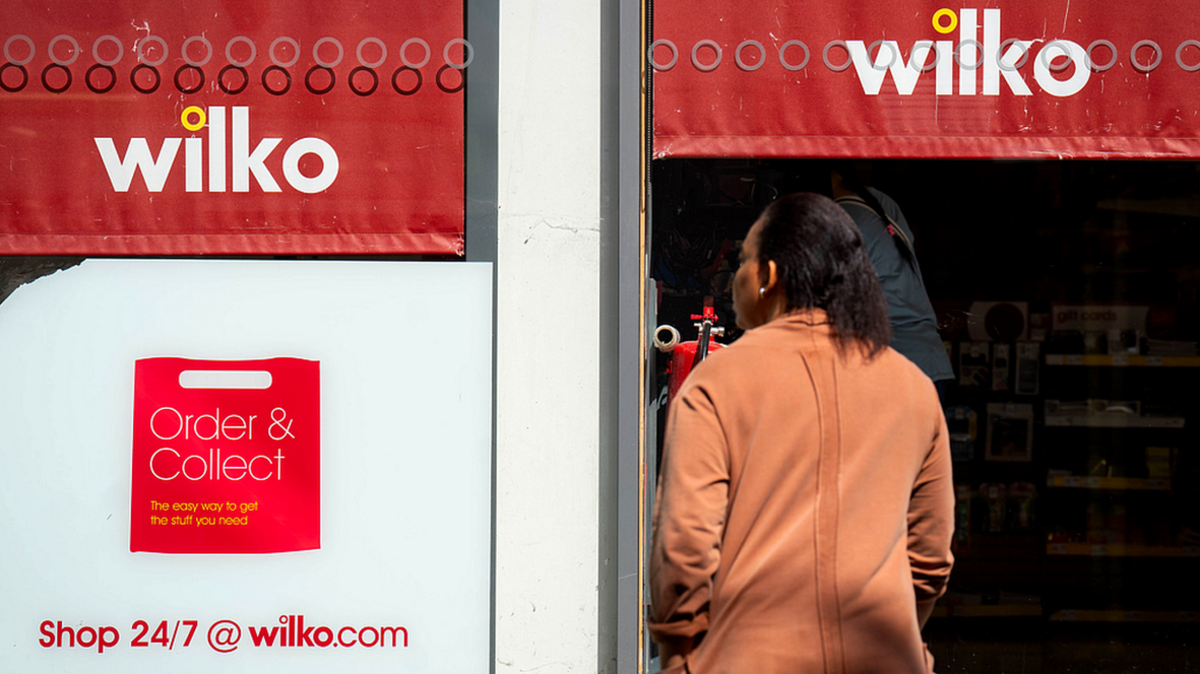Wilko: End of an era as shops shut for good
- Published
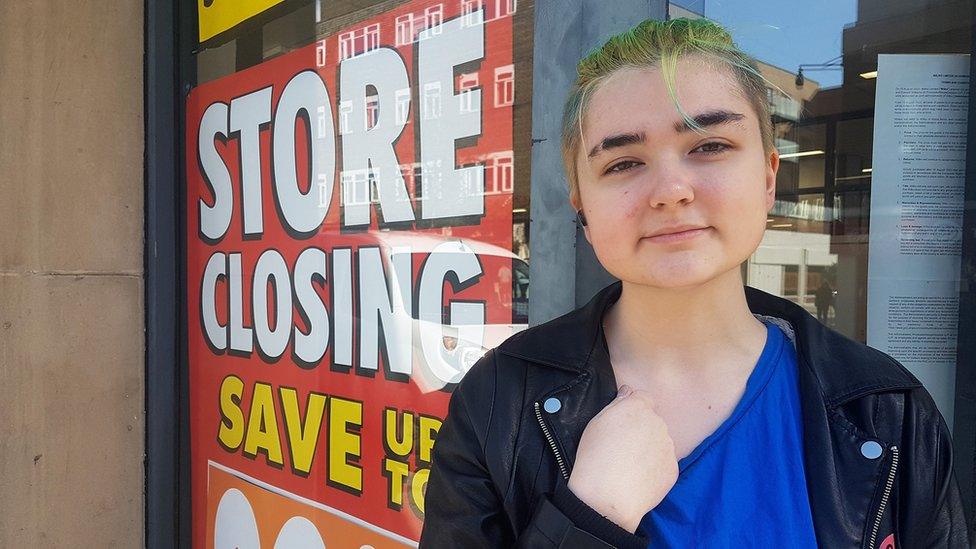
Jaye says she is gutted Wilko will be gone
"Being able to grab a fresh lip gloss, a sketch pad and a Pepsi Max all in the same place, that's definitely something I'm going to miss," says Jaye.
The 19-year-old, whose full name we are not using, doesn't have a lot of spare cash and has found Wilko handy for dog treats, bleach and emulsion paint too.
Today could be her last visit though. Her local branch in Horsham, Sussex closes its doors on Sunday, along with the last Wilko outlets around the country and Jaye is "gutted" at the news.
She has swung by for a final pack of sandpaper sheets she's going to use to make cosplay costumes.
Most of the shelves are bare now and what is left is marked down.
Another customer, Mary, is here with her husband and one-year-old daughter to pick up blinds at bargain prices.
"We're heartbroken," she says. "We were really hoping someone would buy them out and keep it going, you know?"
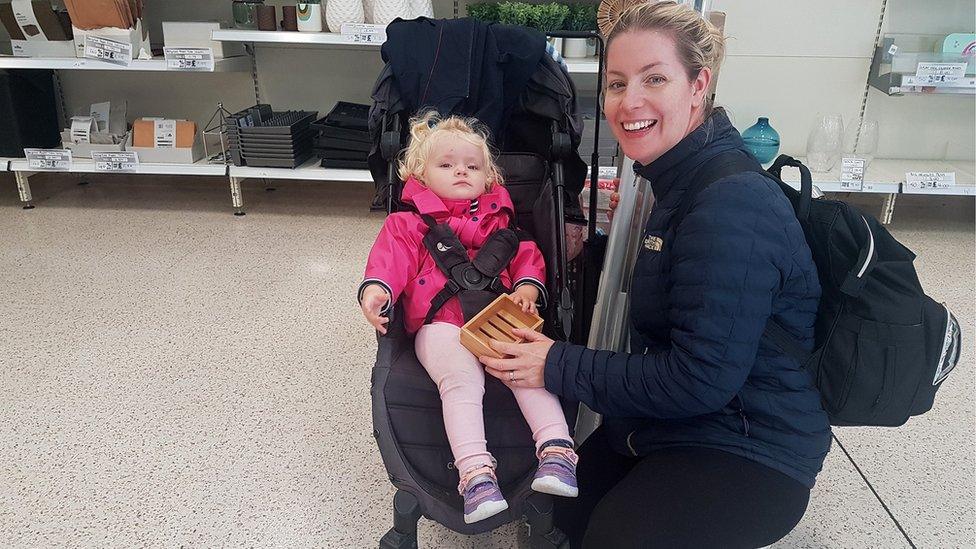
Mary says it is nice to be able to choose things at a store rather than online
They live in a nearby village and used to come in to Wilko regularly to buy craft materials and treat her five-year-old to pick'n'mix.
"I have happy memories of doing that as a child," she adds. "I think it's nice for them to come and choose their own things, rather than someone delivering a parcel to the door."
But the order-online, have-it-delivered business model is here to stay. That, and fierce competition from rivals, has done for Wilko, just as it did for Woolworths over a decade ago.
There was a wringing of hands back then too, when that stalwart of the High Street went. And Wilko took over many of Woolworths' old shops. Now a similar fondness for Wilko has sneaked up and ambushed us all over again.
Other shoppers describe its demise as "tragic" and "awful". The strength of affection can seem strange given the chain sold the most mundane, practical items from sink drainers to cat litter.
"It managed to create a very warm brand personality, which tends to contribute to a very loyal consumer-brand relationship," says consumer psychologist Kate Nightingale.
"As Wilko's brand is associated with home and pets products predominantly, we are already dealing with relationships infused with very heightened emotions," she says.
"These emotions and their intensity is easily transferred into the relationship we have with the brand - it makes a perfect recipe for nostalgia [and a] need to fill in that gap left by a sense of loss."
The future for Horsham's site is not yet clear but some Wilko stores have been bought by other budget retailers Poundland and B&M. That won't fill the gap for all its loyal customers though.
"Without being snobby, Poundland has a stigma attached that Wilko doesn't," says Abby, who is shopping with her wife Steph.
Wilko's appeal was value for money and knowing you would find what you needed, they say.
"We had friends around the other night, realised we didn't have enough wine glasses and managed to pick up a couple of sets for next-to-nothing," Steph says.
The chain going under feels like a broader sign that things are "falling apart", says Abby.
"It was the same with Woolworths. It had been going for so long that when it collapses it's a bit like - oh right, so this is the way we're going. There won't be any of the original High Street shops there used to be."
Wilko was founded in 1930 when JK Wilkinson opened his first store in Leicester. It stayed open throughout World War Two and expanded first across the Midlands then nationally. By the 1990s it had become one of Britain's fastest-growing retailers.
In 2012, Wilkinson began rebranding its stores as Wilko, and by 2014, most branches had emblazoned the new name on their storefronts.
Now its staff in Leicester are particularly sad to see it go.
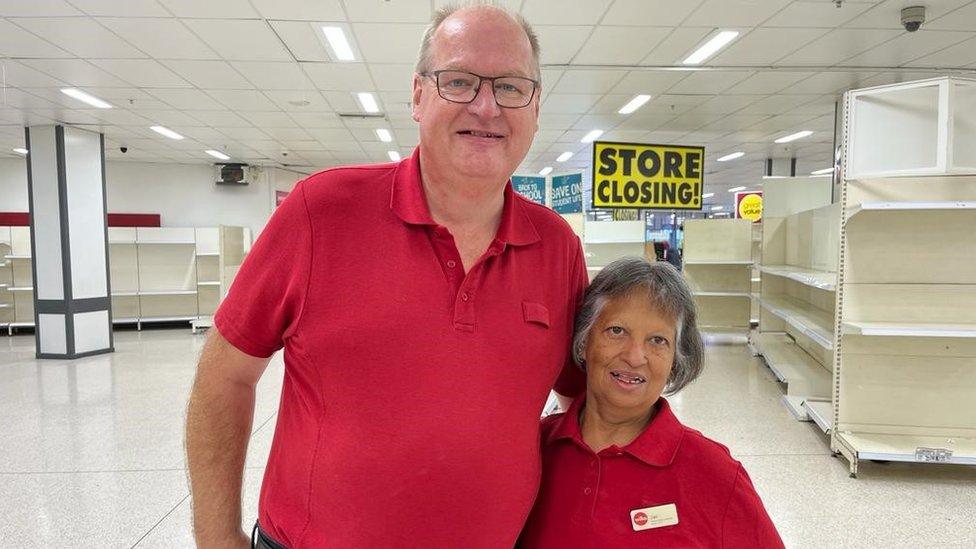
David and Jan have 90 years of Wilko experience between them
Jan Patel was 18 when she started working for Wilko. Now, at 64, she is seeing her last day at the Leicester Lee Circle store. She says it is a "tough day".
She and her colleague David Middleton, who is now 61 and started work with Wilko in 1979, have had hugs and goodbyes from fond customers.
Jan reminisces about working with Wilko's founder, JK Wilkinson.
"He pulled us out of recession in the 80s, he came into the store and has shown us how to trade aggressively. Cheap and cheerful was Wilko's motto - and family. Family meant the world. This Wilko family looked after us, and in return we loved working here," Jan told the BBC.
She says the company took her and her colleagues on training courses to learn how to to do DIY, such as painting and wallpapering.
"It's been a fabulous ride," says David who, like Jan, is now going to retire.

One of hundreds of messages from customers at the Wilko store in Leicester
Some of the chain's 12,500 staff - but not all - will find new jobs with B&M and Poundland.
And customers may catch a glimpse again of the Wilko brand online at least, after it was bought by The Range.
Kate Hardcastle, consumer specialist at Insight with Passion, says many retailers have already "eased their way into Wilko's territory".
"From Poundland to Primark, Aldi, Lidl and more, as value retailers widened the offer, Wilko was being gradually taken off the consideration list - especially by younger consumers," she says.
Younger people were willing to "trade some savings for speed of delivery and direct to door", she adds.
Ash, a 23-year-old who sings and plays guitar in a band at weddings, has been buying essentials at Wilko - shampoo, face wash, deodorant. But unlike Jaye he doesn't think he'll really miss it when it's gone.

Ash says he does not think he will miss Wilko
"I will probably forget about it in a few weeks to be honest," he says.
"For my generation I don't think they'll really mind that much. We've got other options."
Related topics
- Published12 September 2023

- Published11 September 2023
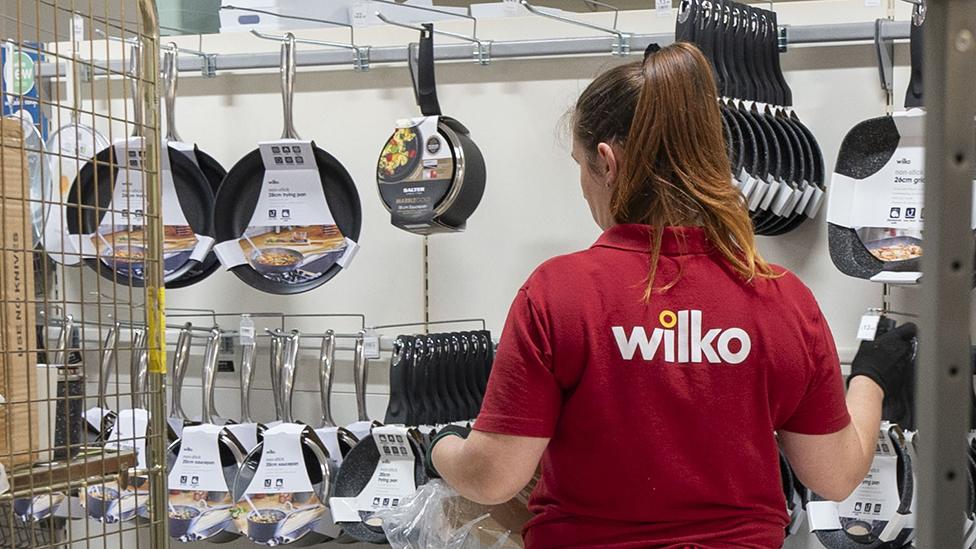
- Published17 September 2023
